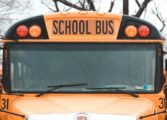By Ruthann Carr, Correspondent
The Fluvanna County School Board heard about bullying prevention, staff survey results and discussed the year-end budget at its meeting Wednesday (June 6).
Superintendent Chuck Winkler said it looks as if the schools will once again finish in the black.
Winkler said each year when he and Executive Director Brenda Gilliam put together a budget their goal is to end the year within one to three percent of the total budget.
Gilliam said as of the first of June, there is $7.1 million left. The school used 82.3 percent of the $39 million budget.
“I still have to run June and July payroll,” Gilliam said.
When it appeared the numbers were favorable, Josh Gifford, director of technology, bought needed Chrome books (computer tablets used for instruction).
Andrew Pullen (Columbia) said he was concerned about the possible public perception of having too much money left at the end of the fiscal year means they’ve budgeted poorly.
A long discussion followed about the difficulty of hitting the exact amount when dealing with moving targets of needs and appropriations.
Gilliam said they don’t look at money left at the end of the year as a slush fund
“These are needs we’ve had all year and have put them off all year to see if we had money left,” she said. “We had two air conditioning units out of four in the (computer) server room quit last week. We had to pay $15,000 just to have someone to look at it. How do you pay for that?”
Winkler said each budget starts with an “initial wish list.”
“The easiest thing is to say we should have given it (money) back to the kids and teachers. But there are way too many unknowns in a $40 million budget to spend down to 10 cents.”
Gilliam noted there are still end-of-year expenses that haven’t been invoiced.
She gave a scenario that she said illustrated the difficulty of hitting budget projections on the nose.
“Let’s say a kid walks in the door in August who has to have an interpreter and the only one we can find is $65 and hour,” Gilliam said. “We have to have the money to do that. There are a lot of moving parts with this budget as opposed to other budgets.”
Winkler said in the end, he expected to finish the year with a little less than a $1 million surplus.
Gilliam provided the results of the most recent staff survey, conducted in May. This is the ninth year the staff has been surveyed and 56 percent responded. Most of the responses came from teachers and instructional assistants.
Overall, the staff’s answers showed improved attitudes toward administration, job duties, professional development, work environment and the school board.
Specifically:
- Work Environment – All six categories have the highest rating of any survey: Communication between building/site administration and community/parents is timely, open, and effective to the educational process; Positive attitude toward work environment (enough copiers, responsive maintenance staff, cleanliness, adequate funding to do the job);
- Building administrative support – three out of 13 categories were higher than any year: the number of and meeting productivity and communication with parents was higher than last year; respondents were happier than in the other eight surveys in clear expectations and support;
- Professional development – two categories out of three were the highest: Professional development days provided applicable strategies and useful tools for improvement;
- Professional duties. Only one out of six categories highest: Class sizes conducive to learning 65.60 percent;
- Climate and culture – all categories rated highest of any survey: job satisfaction, (93.26); 87.36 percent would recommend working at FCPS; 80.29 percent and 75.72 percent respectively felt valued and recognized;
- Superintendent’s office – Respondents reported feeling supported as a professional, allowed to openly provide input, the mission and vision was clearly communicated, the office recognizes concerns unique to each grade level, facilitates discussion on relevant topics and is visible in in the building and at school activities. This was the highest ratings in six out of eight categories of all surveys;School Board – was rated the highest of any past survey in all four categories: feeling supported, communication, comfortable talking to board members, visible in building and during school activities.
No category contained the lowest score of any survey.
The report will be sent to all staff in an email. During the summer and early fall, principals will discuss the results in strategic planning meetings and will review the data with staff during the August work week.
Technology Director Gifford said within a couple weeks all computer fiber installation will be complete.
Winkler said the Board of Supervisors extended funding for the Capital Improvement Plan (CIP) to repair the roof at Carysbrook.
He said he bought a 12-year-old school bus to serve as the Outreach bus to bring books and computers to underserved neighborhoods. Paul Chirico’s shop/carpentry class will gut it and put in shelves.
The Board discussed probationary terms of service – whether to extend from three years to five before offering a continuing contract (tenure). A final decision will be made at July meeting.
Meal prices for 2018/2019 school year will go up 10 cents for lunch ($2.95 at the middle and high schools; $2.70 at the elementary schools). Breakfast will remain the same at $1.35
Unpaid cafeteria meals for the year amounted to $41,000
Pullen said he supports the meal prices but wants to find a way to make people accountable for their cafeteria bill.
“Some counties attach it to a person’s personal property taxes,” Pullen said.
Winkler said, “I’d encourage us to not hurt a child in the process.”
Each school administrator reported to the Board what’s already in place in regard to relationships and bullying
Amy Barnabei, principal Central and West Central Primary, said they avoid the use of the term bullying.
“We talk about friends and how to be a friend. We focus on citizenship, responsibility, acting kindly and staying safe. “
When students demonstrate those behaviors, they get a token. In that way students are rewarded for good behavior. Barnabei said the staff models the good behavior expected from students. “We take the positive approach,” she said.
Carysbrook Principal Scott Lucas does a variety of things to demonstrate and teach good behaviors of taking care of school, teachers, peers and yourself.
They teach students to speak in “I” messages in which the student tells someone how what they do affects them. In October they have a kindness challenge.
They also have Starburst Day. On that day as students enter the building they get a starburst candy. At lunch, every child with that color candy sits together at one table, encouraging them to get to know other students.
Gemma Soares, middle school principal, said counselors and teachers came up with their own curriculum that aimed to create a culture of kindness.
Staff recognized students who displayed kindness and empathy by giving them two bracelets, one to keep and one to give to someone else.
The bracelets read “Be Kind. Make a Difference. Pass it on.”
They had a weekly community hour in which they read the book Wonder then saw the movie.
A University of Virginia professor met with teachers at the middle school to talk about self-care and how to react in stressful situations.
New High School Principal Margo Bruce passed out a pamphlet given to each student about how to treat others with kindness. Last year, once a month, 16 students displaying kindness got to have dessert with the principal. A group of students started an anti-bullying club that puts notes and cards on lockers.
The Board voted unanimously to remove language requiring a person be deceased at least 10 years before having a building or facility named after them.
They also unanimously approved the new school lunch price.




